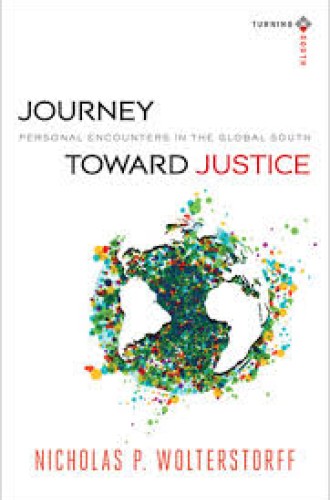Journey toward Justice, by Nicholas P. Wolterstorff
Nicholas Wolterstorff is one of the great thinkers of our time. As the Noah Porter Professor Emeritus of Philosophical Theology at Yale University and senior fellow at the Institute for Advanced Studies in Culture at the University of Virginia, he has been a leading Christian philosophical voice both in the academy and the church. So he is a catch for the new Turning South book series from Baker Academic, which promises to address the implications of the shift of Christianity to the Global South. The idea of the series is to invite authors to reflect on how the experience of non-European forms of Christianity is changing the nature of Christianity as a whole. Autobiography is supposed to encounter theology. So how does this book do?
At the outset Wolterstorff admits that autobiography is not his genre. The mixture of his Dutch Reformed heritage and his philosophical training makes the telling of a narrative very tricky for him. Instead, his fame rests on his finely honed philosophical skills that allow him to organize and present precise distinctions. Therefore, perhaps it isn’t surprising that his autobiographical accounts of encounters with the Global South are limited.
Read our latest issue or browse back issues.
Early on he describes a set of experiences that were formative for him back in the 1970s. The first was in South Africa in 1975, where he heard the cry for justice from black South Africans; the second was in Chicago in 1978, where he first listened carefully to the cry for justice from Palestinians. These were his “awakening experiences.” He relates these narratives briefly; he doesn’t paint a descriptive picture or provide a portrait of his feelings and reactions. Instead he simply documents the facts—time, location, nature of the meeting.
Later in the book he documents two other significant encounters. These accounts are more detailed. The story of his six days in South Africa in 1985, when he was called to be an expert witness in the bail-conditions court case of Allan Boesak, is gripping. He captures the drama of the courtroom and the manifest incompetence of the South African authorities extremely well, and he offers thoughtful observations comparing the dispositions of the oppressed with those of the oppressors. His description of a visit to Honduras is also engaging. The challenge in Honduras was a corrupt judiciary and policing system that allowed crimes against the poor to go unpunished.
But that is all: for the rest of the book, Wolterstorff the autobiographer disappears, and Wolterstorff the philosopher comes to the fore.
So then, the title and series description are misleading. This book is not primarily autobiographical; nor are the encounters with the Global South central. As Wolterstorff admits, his argument can just as easily be applied to the civil rights campaign in the United States. However, this is a must-read book anyway. It is a carefully honed analysis of justice within a Christian framework. Read in this way, it is a truly great book.
Wolterstorff has given the issue of justice considerable attention in recent years. In 2008 his highly acclaimed Justice: Rights and Wrongs appeared, and it was followed in 2011 by Justice in Love. Both are demanding, detailed texts. Journey toward Justice is an outstanding, accessible summary of his entire argument that is desperately needed because his argument is both correct and pivotal for a Christian engagement with the world.
Unlike Plato and John Rawls (who thought about justice from the perspective of an ideal society), Wolterstorff starts with those who have been denied their fundamental rights, then sets out an account of justice that is grounded in scripture and tradition and provides a framework for social action. He is correct that justice must be grounded in the language of rights, even though rights language is occasionally abused. Rights language captures an intrinsic order within the universe: rights are grounded in “the worth, the value, the dignity of human beings.”
When writing explicitly about rights that humans have (which are a subset of rights in general), Wolterstorff stresses “the Christian vision of things,” in particular “God’s love for each and every one of God’s human creatures—more specifically, God’s desire for friendship or fellowship with each and every human being.” This account of rights is found in many patristic writings, including those of Ambrose of Milan, Basil the Great of Caesarea, and John Chrysostom. It is also found in scripture. Wolterstorff makes much of the translations of the New Testament that fail to recognize that rendering dikaiosynē as righteousness does not capture the centrality of the concept of justice embedded in the Greek word. He is rightly hostile to the ways in which love is set up in opposition to justice. Love should seek to advance the good of others, in respect to both their well-being and their worth.
Wolterstorff also thoughtfully and perceptively touches on the importance of empathy and the structure of social justice movements. One gem embedded in this book is his discussion of the relationship between beauty and justice. He is hostile to the propensity of some organizations to so focus on feeding and advocacy that they create an ugly environment that denigrates the people they are seeking to serve. He commends the Inner City Christian Federation, based in Grand Rapids, Michigan, as a model organization that seeks to ensure that their renovated housing is beautiful because “beauty is a gift from God.”
This book is an extraordinary gift to the church, an invitation into an understanding of the Christian drama that is focused on advocacy for those who are being denied their fundamental value as human beings. Accessible yet demanding, it is a powerful contribution to the literature.






